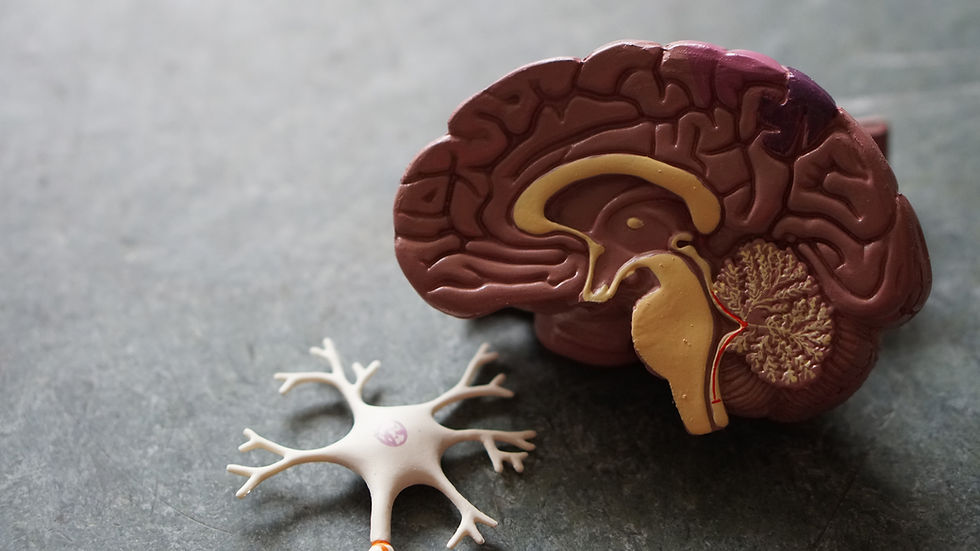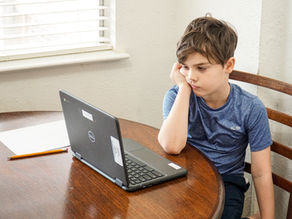Meet the Presenter: Katie Menear
- Oct 17, 2024
- 4 min read
Updated: May 4, 2025

Have you always had a love for science?
Ever since I was little, I’ve had a love for the natural world. I was very much the kid who was constantly hunting for bugs, climbing trees and getting covered in mud and pond water and who knows what else while exploring the world around me.
As I got older, I became more interested specifically in human biology and health, including mental health, and as a teenager began to devour books on different mental health conditions and developmental disorders, which is where my love for psychology and neuroscience came from!
What is your earliest science memory?
One of my earliest science memories comes from a visit to Body Worlds in Amsterdam with my family when I was younger. I remember being fascinated by how the human body, and other animal bodies, looked under the surface and how they worked. I also remember being fascinated by the preserved brains on display, and their role in our lives.

Do you have any favourite women in STEM and why?
I have a lot of favourite women in STEM, it’s hard to choose! But I think one of my personal favourites is Alie Ward. As someone working in science communication, not only do I work for Braintastic! Science as a Science Presenter, but I also work for / have worked for several different STEM museums and charities, meaning I need to communicate in several different fields in science, not just psychology and neuroscience! Alie Ward’s podcast “Ologies” has been a really insightful (and entertaining!) way to “up” my knowledge in areas such as volcanology, marine science and weather – to name a few! She’s a big inspiration to me as a science communicator early on in my career!
What do you enjoy most about being a Braintastic! Science Presenter?
Being able to share my passion for the brain with young people! My favourite interaction with young people is when I get to share an incredible fact about our brain and the way we experience the world around us, and I get a response of “wow, that’s so cool!” I also love when young people share their favourite science facts with me, and this has led to me learning a lot about dinosaurs and space!

What do you do for work when not presenting for Braintastic! Science?
I’ve previously been a Science Explainer for Life Science Centre, where I performed and facilitated many shows, workshops and experiences surrounding different topics in STEM. I’m now going to work as an Engagement Officer with Dynamic Earth, where I’ll be developing and delivering science learning content with a focus on life on Earth, its formation and climate change!
What do you like doing in your spare time?
I’m a BIG reader (currently on track for my goal of reading 60 books this year!), and I love to do a lot of baking and drawing in my spare time as well! I’m also currently getting into Dungeons & Dragons, and should start working on my character sheet…
Do you have a favourite quote?
One of my favourite quotes comes from David Eagleman’s book Incognito: The Secret Lives of the Brain: “You´re not perceiving what's out there. You're perceiving whatever your brain tells you.” This quote helps me a lot when I’m feeling particularly anxious, and helps me deal with cognitive distortions that may not be based on facts, but based on emotion!

What science books did you like reading as a kid?
I remember reading a lot of the Horrible Science series when I was younger! I also remember going through bird / nature spotting guides, and drawing and painting the photos I found in them for hours.
Why do you think it’s important to help young people understand their brains?
I think there’s many good reasons young people should learn more about their brains, but a major concern for me is mental health. Youth mental health is getting much worse in the UK and all around the world, and helping young people understand their brains will lead to them learning healthier coping strategies, and be able to recognise signs of deteriorating mental wellbeing in themselves and in others.
What one big question about the brain would you like to know the answer to?
One mystery of the brain I find fascinating is if we will ever be able to fully know everything about it. As we research and learn more about our brains and the connections forming in them, we form new connections as a result of this knowledge! Personally I don't think we will ever fully understand our brains, but we can still make progress, and I’m excited to see what new questions we answer in the future!

Why did you decide on a career in psychology?
I decided to study psychology at university as originally I wanted to work in the mental health field when I left university. However, I now use my knowledge in psychology to help me in my career in science communication. Not only do I teach young people about the brain, but I can use my knowledge of areas such as developmental psychology and educational psychology to improve my communication and encourage young people to learn and have fun doing it! I feel my background in psychology has been essential to my current career.










